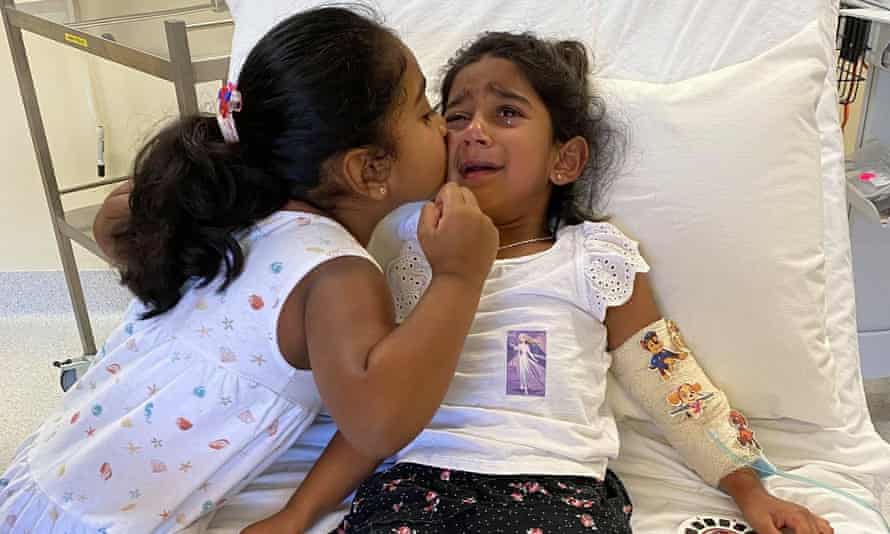Extract from The Guardian
It’s easy to see why Biloela has fallen in love with the family, doggedly resisting the government’s false narrative

Last modified on Wed 9 Jun 2021 10.34 AEST
The photograph of five-year old Kopika Murugappan kissing her three-year-old sister Tharnicaa in hospital undid me. Tharnicaa is crying and the girls look both unbearably sweet and heartbreakingly sad.
The image was taken just before Tharnicaa was flown to Perth from Christmas Island amid fears that she had a blood infection caused by untreated pneumonia. It represented the latest chapter in the family’s arduous detention saga.
It’s easy to see why the little community of Biloela has fallen in love with the Murugappans. Kopika and Tharnicaa have grown up in front of us and we have watched as Tharnicaa has gone from a chubby infant in pretty dresses and headbands to a lean three-year-old, all teeth and smiles. She and Kopika often wear matching clothes and in videos their parents – Priya and Nades – seldom show frustration, even though they have endured more than most of us would manage.
In the last year the two little girls have become poster children for the ills of Australia’s refugee system. Neither of them asked to be anyone’s poster child, of course. They are living, breathing kids and one of them happens to be very sick. They have not asked for the burden of representing everyone else who is stuck in Australia in an endless loop of temporary visa protection. They are pawns in a game that neither they nor their parents designed.
If the minister manages to get them out of detention, many Australians will breathe a sigh of relief and consider themselves morally vindicated. Many Australians desperately want to see themselves as decent people, despite the immigration policies their governments have adopted.
This is understandable. No nation likes to think of itself as racist, mean-spirited and xenophobic, even when its policies are clearly all of those things.
Yet securing the release of Tharnicaa and her family will not alter the fact that Australia remains a place where children can grow up in indefinite detention, and it will do nothing to address the fact that 30,000 asylum seekers remain in limbo, living on temporary visas just like the Mungarrapans did before theirs expired and they were threatened with deportation.
Long-term policy reform will only be possible when the public begins to challenge the false narrative that underpins Australia’s attitude to refugees. Much of the present-day vitriol against people arriving by boat began 20 years ago when John Howard and his senior ministers claimed that a group of asylum seekers had thrown a child overboard from a sea vessel as a ploy to force the Australian navy to rescue them.
The public was livid and, even though an inquiry found the claim to have been a lie, the idea that people arriving here by boat are so craven, so singularly focused on duping immigration officials that they are prepared to do anything to get in, is the founding untruth upon which the refugee detention system is designed.
The detention industrial complex that has mushroomed since that day continues to operate on Christmas Island. When Priya’s friends claim that her requests for medical assistance for her daughter were greeted with scepticism, and as a result Tharnicaa’s access to healthcare was delayed, the contours of the children overboard scandal can clearly be seen.
The subtext is that asylum seekers will do anything to secure access to the mainland, even if it means subjecting their own children to trauma.
Far too many people continue to believe this stereotype; that people seeking safety are liars and queue jumpers. In this context a policy landscape designed to punish them for even trying to seek freedom in Australia is perfectly logical.
For two decades now successive governments have vilified and insulted asylum seekers. But, as the case of little Tharnicaa and her family has demonstrated, this approach is wearing thin.
A small community in Queensland has doggedly resisted the government’s narrative about people seeking freedom, choosing to trust their own instincts rather than government assessors.
For the people of Biloela, the Mungarrapans’ status as asylum seekers is incidental. The family of four are their neighbours and friends. The way they tell it, Tharnicaa is neither a poster child nor a symbol, simply a little girl who is sick and tired. In the story they tell, Priya and Nades are neither liars nor terrorists; they are just stressed-out partners like so many of us, parents who need a bit of a break.
The government may release the Mungarrapans on compassionate grounds. If it does, Australians will need to push Scott Morrison to free the other 30,000 people who have waited so long to be free from the legacy of the Howard government’s lie.

No comments:
Post a Comment